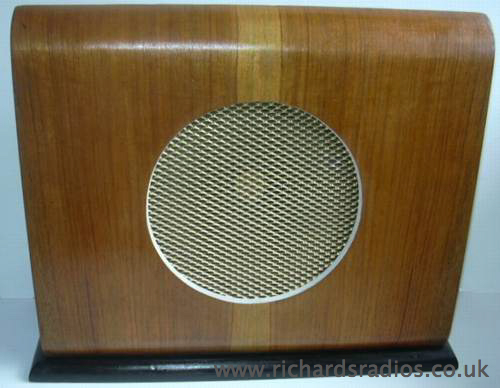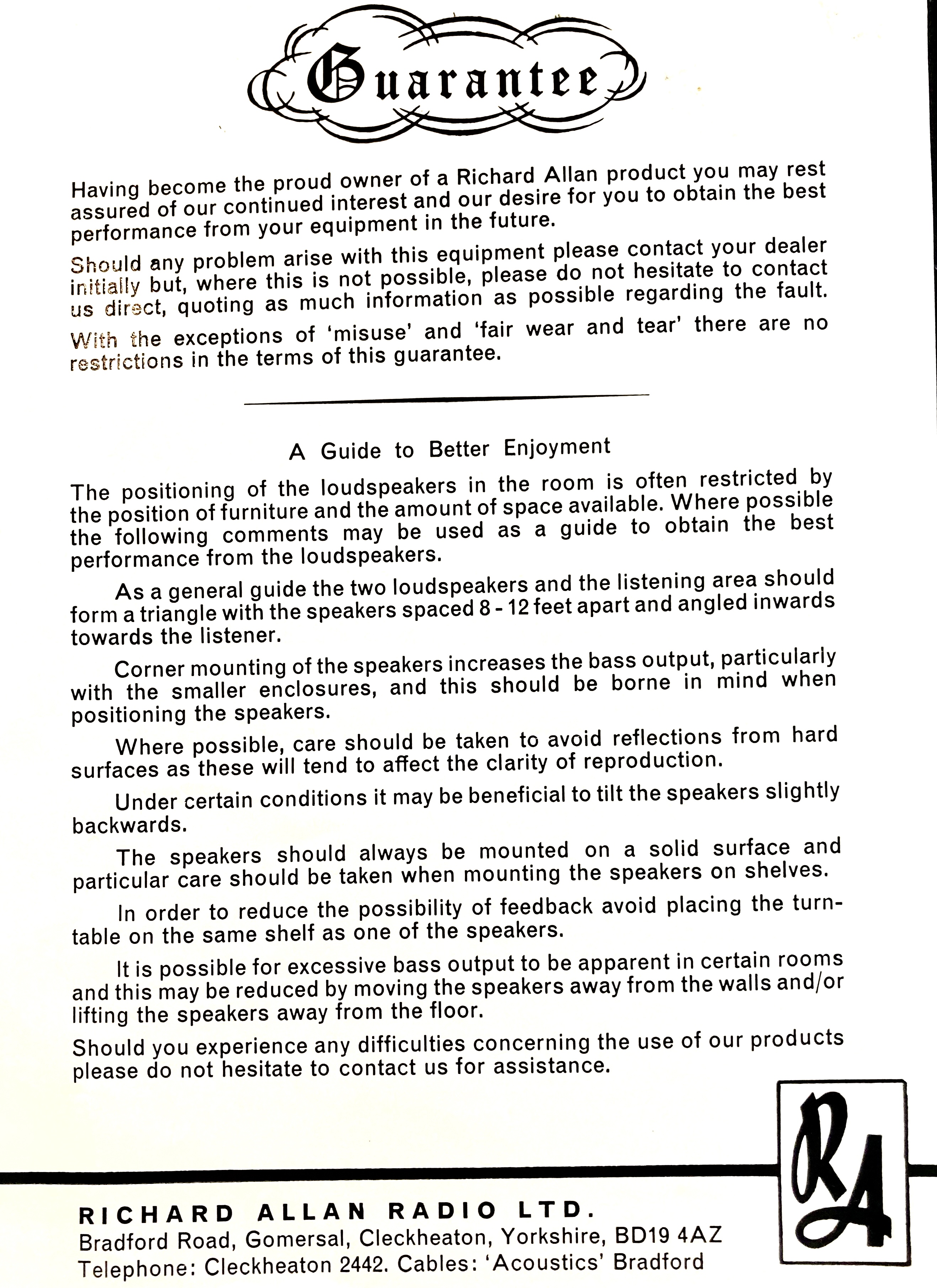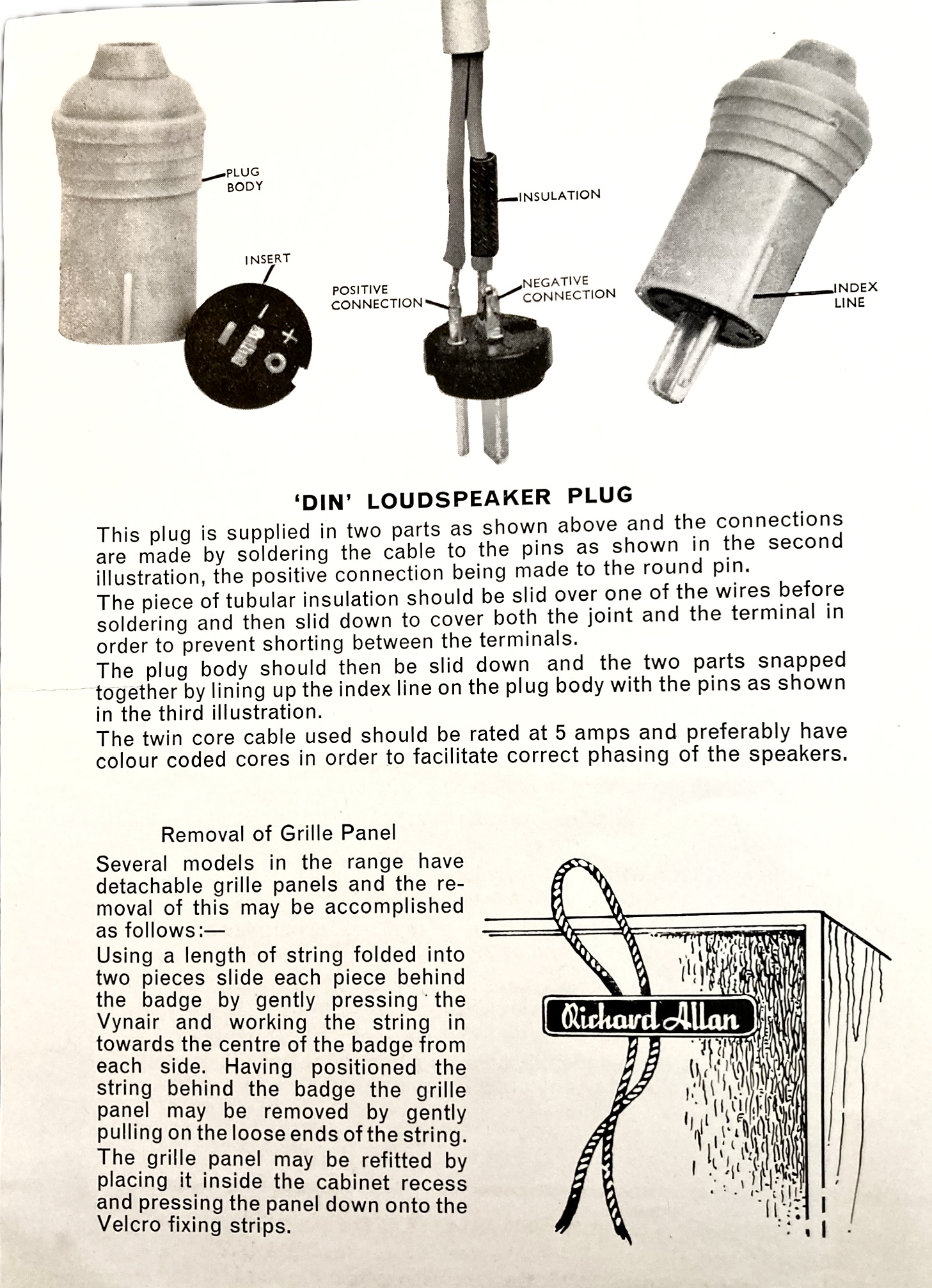

Richard Allan Radio Company Ltd. "Bafflette" extension loudspeaker. 6 inch moving coil permanent magnet with six position switched volume control in veneered wooden case. I am not sure how old it is, but I guess it was made about 1953. Radios made before this date often had connections for external speakers.
I bought this loudspeaker on Ebay as this was an opportunity to have something with my name on it! Nobody else seemed to want it. It was in a sad state, very dirty, volume control knob missing and some of the veneer had broken away.

This guarantee and instruction leaflet which problably date from the
mid 1980s indicate tha the firm had moved from the Batley Works.


Richard Allan Loudspeakers actually started life as RICHARD ALLAN RADIO LIMITED in 1949. Surprisingly there never was a "RICHARD ALLAN". The name comes from the sons of the two people who formed the company. In the 1990's, it became RICHARD ALLAN AUDIO LIMITED. It is now part of the MAGNUM group of companies. Incidentally although I share the name, I am not related to the founders of the firm! The firm which is almost 60 years old still exists and has facilities for the repair of their products.
http://www.ratechnology.co.uk/
Magnum Group
Wakefield House
84, Wakefield Road
Brighouse
West Yorkshire
HD6 1QL
UK
Tel: 01484 475950
Fax: 01484 716384
History of the Richard Allan company
John Garfield, a son of Jack Garfield, one of the founders of the Company has contacted me and provided the following information about the early history of the firm. He was born in Batley in 1949 and his brother, Richard, was born in Batley in 1946.
Richard Allan was started by a group of friends in Batley. The name was derived from the sons of two founder members. My father Jack Garfield's first son was Richard and the son of one of the other founders was Allan. Hence Richard Allan. [see below for the second partners name.]
The original shape of the Bafflette speaker was different to the model shown. A side view section showed it flat on the front side and curved at the back. The shape was determined by the lack of supply of wood after the second world war and was the most economical use of the wood available. My father was I believe the sales manager but also helped to source supplies and travelled to I believe London to obtain a licence to purchase wood for production.
My father also said that when they were trying to produce their first loudspeaker it was of superior quality to most others available at the time but production costs were higher than other models and as a consequence they could not sell them. Ultimately they reverse engineered a competitors unit, made some minor modifications and then went into production. We used to have a photograph of their stand at the Radio Olympia show. We also had a Bafflette speaker which, last time I saw, was in the possession of my brother Richard's eldest son Andrew.
My father spoke often about the early days of Radio. For instance, a significant number of houses had no electricity and were heated by coal and lit by gas. As a consequence radio shops ran schemes whereby customers bought a radio and then hired lead acid batteries which were exchanged/recharged as required. Indeed my father claimed that Hire Purchase credit was first used for the purchase of radios and batteries.
Before radios became affordable, it was common for a radio dealer to erect wires throughout a town and just have speakers in each house. They call it cable TV these days! Indeed after my father left Richard Allan he subsequently purchased a business in Motherwell, Scotland, called MRS Ltd. The MRS stood for Motherwell Relay Service and at some stage prior to his involvement, did just that. Another famous name in the trade BRW, was British Relay Wireless. Both these firms diversified into rental television.
Unfortunately my father suffered with undiagnosed diabetes and was advised to sell MRS Ltd. in 1960. BRW purchased it from him and he had by that time 110,000 TV sets rented out. My brother and I were only 11 and 14 at the time so could not be involved in any meaningful way. Had we been a few years older I'm sure he would not have sold out.
My father recounted that shortly before the second world war someone was demonstrating how a reflected radio signal could be detected and projected on an oscilloscope. They were directing a beam at a wall across the road, when a bus interrupted the beam. This varied the signal. Someone commented that if they'd attached a machine gun to it it would have automatically fired at the bus.
When my father volunteered to join the RAF at the start of the war, he was asked what skills he had. He explained that he knew about a system called radar. The recruiting officer replied that they only had vacancies for cooks or airframe fitters. So he became an aircraft fitter for most of the war, stationed initially in Lincolnshire and later in Africa. At some stage late in the war the RAF discovered his skill and he was co-oped into the Fleet Air Arm fitting radar to Swordfish, working under the control of his apprentice who had waited to be called up, by which time the RAF had learned about radar.
I have a feeling that the Allan in Richard Allan referred to Dennis Newbold's son Allan but don't quote me on that! Dennis Newbold is just a name that my father mentioned when talking about old times. If he indeed had a son, or was involved in Richard Allan I'm unsure.
Bernard Ledwith contacted me saying "Caught your site when reminiscing about an old friend, Allan Whorley, who was the son of one of the original founders of Richard Allan Radio Limited. I met him when on holiday in Thailand in 1986 and he took me to meet his agent, an interesting experience. I kept in touch with Allan and visited him at his factory in Cleckheaton. I remember he lived In Dewsbury and was a very charming, happy go lucky sort of chap.My wife and I met up with him and his wife on a number of occasions. They were a little older than us so I suspect Allan would be no longer with us. We have moved around a lot ourselves but lost touch, as happens."
David Pratt who had used a pair of Richard Allan bookshelf speakers for many years has written that the above reminded him of his time working at Mains Radio Gramophones Ltd (later Baird Television Ltd, and even later Thorn-EMI Ferguson) in Bradford in the late 1950s. They used Richard Allan speakers in their TVs and radios.
The mention of Dennis Newbold in the last paragraph above intrigued him. He remembers a couple of guys leaving Richard Allan and starting up Fane Acoustics (also of Batley) in competition, beginning by making their speakers in one of their wives' kitchen, baking the speakers in the oven. One of these guys was a Mr Newbold. He does not remember his first name, but it is most likely the same person.
Donald Peers says that the Allan in Richard Allan was after Allan Worley the son of one of the founders. When he worked there [from 1964 to 1980 then part time as consultant until their final demise] the father was always known as Mr Worley so he ever knew his Christian name. There was also Ken Sykes.
The name Fane was originally derived from the names of the two founders who formed the company in 1958, Dennis Newbold and Arthur Faulcus. See: http://www.fane-acoustics.com/

